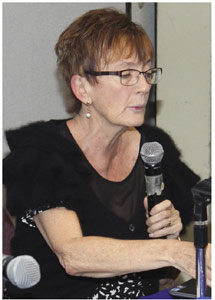 |
 |
 |
|
June 2015 |
The Minister of Education had himself noted that most children are not being catered to (CARICOM/UNESCO meeting, November 16, 2013) and we knew that the only full-time speech-language pathologist working for the Ministry of Health works at the General Hospital in Tobago. We sought to get a real understanding of where the challenges in the system lay in the hope that they might then be specifically addressed. A child case history form was developed which included a question on financial support for child needs, and two questions on informants’ experience of medical and educational processes. Data was collected at three private clinics, two of which run schools for children with speech and language needs. One Clinic was in North, one in South and one in Central Trinidad. Parents were asked for details of the education their children had received to the time of filling out the form. We have identified those who are reported to be receiving government education and those receiving speech therapy services, including those supported financially by the Ministry of Social Welfare, Ministry of Health or NGO. Five persons reported specifically that they received support from the Ministry of Social Welfare to whom they submitted receipts from the Speech-Language Clinics they attended. Three of these also reported original referrals to the SLP Clinic by the paediatrician at San Fernando General Hospital. The findings record only 10% of the children being in government schooling and only 30% to be receiving speech and language services. Of these more than 50% of girls and 30% of boys receive no financial support. When reasons were given for non-attendance at government schools these included most specifically the need for an aide to work with the child. We were informed that government had advertised for classroom aides without success. One mother gave a figure that was supplied to her of two aides for 200 applications. If an aide in the classroom can support a child, he/she may enter the school but if not the school deems it impossible because of potential disruption and the inability of a single class teacher to give individualized support. Informally, we were assured that those who do work as aides are persons doing on-the-job-training (OJT) with no special qualification for this work. Some parents reported that their children attended a variety of private institutions/special schools and for the autism spectrum disorders four persons reported having received supportive part-time educational services from the Autistic Society of Trinidad & Tobago. Since we know that 12-20% of our school age population have speech and language difficulties it seems we need to do better in providing for their needs. This population can contribute significantly to their social environment and the local work force if they can obtain education and therapy, but become a drain on themselves and society if they cannot get support. It is suggested that massive restructuring of education and allied health care sectors is needed immediately to redress the current deficit. More direct access to funding for therapeutic services is perhaps the simplest concern to tackle and the provision of aides for children with speech and language difficulties perhaps the hardest. Training could be obtained however, for persons seeking graduate employment. Finally SLPs need to be attached to each hospital and health centre and several attached to each school district. We recognize that these provisions would cost money but what better resource could be invested in, as Eric Williams so rightly saw, than the growing generation.
This is a modified version of a paper presented by Professor Valerie Youssef at a conference hosted by The UWI Network and Outreach for Disability Education and Sensitization (NODES) and the Disability Studies Unit (DSU), UWI, St Augustine on April 23 and 24, 2015. The conference theme was “Towards Social Integration: Rights, Roles, Recognition of Persons with Disabilities.” |


 In late 2014 it was observed that parents attending a private speech-language clinic in South Trinidad had one topic that they voluntarily discussed while waiting for their children: the lack of access to support for their children’s medical and education needs. Since this complaint ran at odds with the provision of services described on Government documents, a questionnaire was set up, to be supported, when possible, by interviews, in order to find out more about this apparent contradiction.
In late 2014 it was observed that parents attending a private speech-language clinic in South Trinidad had one topic that they voluntarily discussed while waiting for their children: the lack of access to support for their children’s medical and education needs. Since this complaint ran at odds with the provision of services described on Government documents, a questionnaire was set up, to be supported, when possible, by interviews, in order to find out more about this apparent contradiction. 